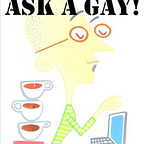Gay? Queer? Homo? Fag?
Dear Hank:
It’s taken me a while, but I’ve finally figured out I’m not heterosexual. Now I’m confused. Do I say I’m homosexual? Am I gay? Am I queer? And what does “fag” mean? Could that be me? How do I identify myself?
Tommy de Cipher
Dear Tommy:
There are several options. If you find yourself sexually attracted to men (but not to women) you are “homosexual.” If you are sexually attracted to men and women, you are “bisexual” or “pansexual.” If you aren’t sexually attracted to men or women, you are “asexual.” And if you are only sexually and romantically attracted to yourself, you are “autosexual”!
If you identify as “homosexual,” you have those other options you mention. What you call yourself might have a lot o do with your age. A guy who is 50 or older is likely to describe himself as “gay” and might get a little upset if you call him “queer.”
Jordan Redman explains in a story for “The Gayly” that the word “gay” was used as early as the 12th Century and comes from the Old French word “gai,” which means “full of joy or mirth.” Redman explains that “gay” wasn’t associated with sex until the 1600s. In 1951, use of “gay” to describe someone who is homosexual became official when the Oxford English Dictionary defined it that way. It was often seen as a slur.
However, in the late 1980s and early 1990s, younger homosexuals (and lesbians) started to embrace the use of “gay” to describe themselves. It was a way for them to declare that while they wanted their rights, they didn’t want to be assimilated into heterosexual culture.
So a word that is used to mean “happily excited” or “bright and lively” now is used to describe someone interested in others of his or her (or their) same sex. Merriam-Webster, the consummate dictionary of the English language, now ranks that use of gay as Number 1 in its four definitions of the word. Number 2 is “Happily excited, merry.” Number 3 is “bright, lively,” and Number 4 is “given to social pleasures.”
The word “queer” used to mean odd, or strange, or peculiar. In the late 19th Century, those who didn’t like homosexuals started to use the term to describe us negatively. Today, “queer” describes a man who is sexually attracted to men. But for some it has a broader definition, describing both men and women who are attracted to the same sex or are bisexual. In other words, it includes lesbians.
“Fag” remains a no-no, unless you’re a Brit using it to describe a cigarette or really hard work.
So, gay or queer. It’s your call!
Your Proud Queer, Hank
Questions you straight people can’t bring yourself to ask your gay friends and neighbors? Or maybe you’re just queer and befuddled. Send them to Hank@AskAGay.net. (Warning: The answers will be factually correct, but might not be politically correct)
